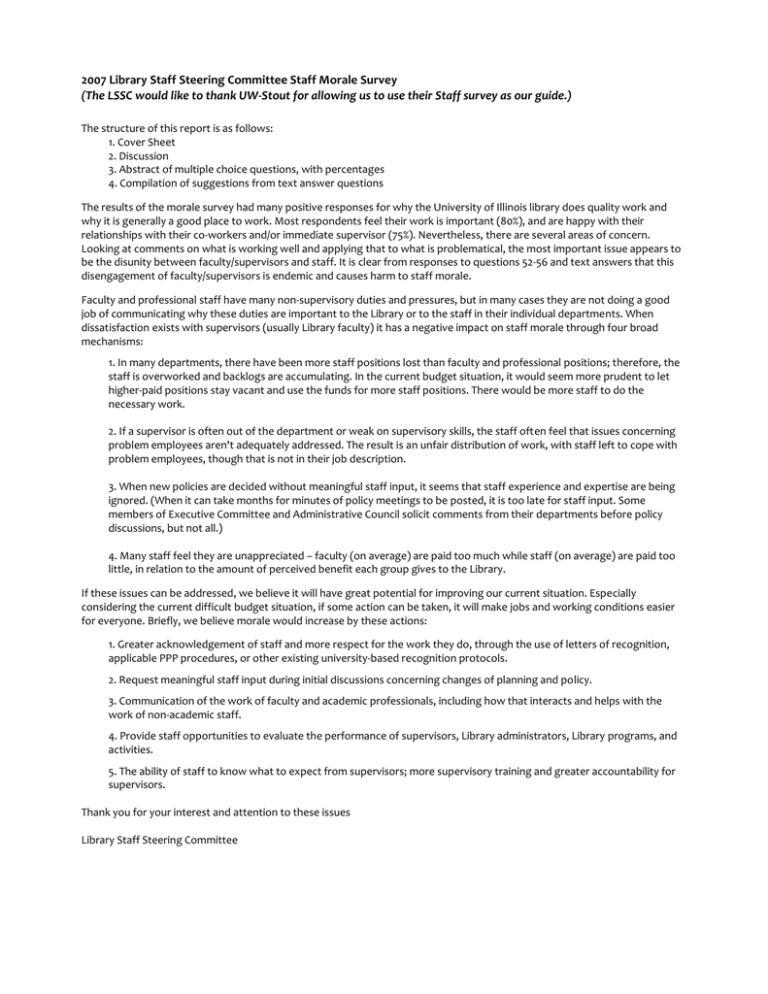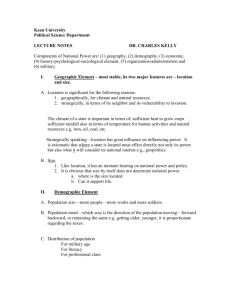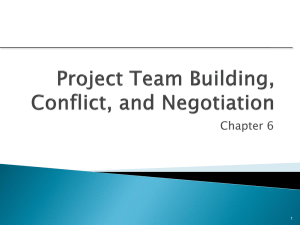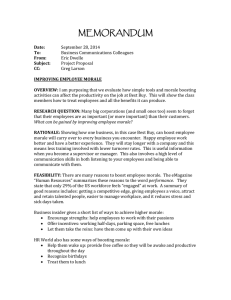2007 Library Staff Steering Committee Staff Morale Survey
advertisement

2007 Library Staff Steering Committee Staff Morale Survey (The LSSC would like to thank UW-Stout for allowing us to use their Staff survey as our guide.) The structure of this report is as follows: 1. Cover Sheet 2. Discussion 3. Abstract of multiple choice questions, with percentages 4. Compilation of suggestions from text answer questions The results of the morale survey had many positive responses for why the University of Illinois library does quality work and why it is generally a good place to work. Most respondents feel their work is important (80%), and are happy with their relationships with their co-workers and/or immediate supervisor (75%). Nevertheless, there are several areas of concern. Looking at comments on what is working well and applying that to what is problematical, the most important issue appears to be the disunity between faculty/supervisors and staff. It is clear from responses to questions 52-56 and text answers that this disengagement of faculty/supervisors is endemic and causes harm to staff morale. Faculty and professional staff have many non-supervisory duties and pressures, but in many cases they are not doing a good job of communicating why these duties are important to the Library or to the staff in their individual departments. When dissatisfaction exists with supervisors (usually Library faculty) it has a negative impact on staff morale through four broad mechanisms: 1. In many departments, there have been more staff positions lost than faculty and professional positions; therefore, the staff is overworked and backlogs are accumulating. In the current budget situation, it would seem more prudent to let higher-paid positions stay vacant and use the funds for more staff positions. There would be more staff to do the necessary work. 2. If a supervisor is often out of the department or weak on supervisory skills, the staff often feel that issues concerning problem employees aren't adequately addressed. The result is an unfair distribution of work, with staff left to cope with problem employees, though that is not in their job description. 3. When new policies are decided without meaningful staff input, it seems that staff experience and expertise are being ignored. (When it can take months for minutes of policy meetings to be posted, it is too late for staff input. Some members of Executive Committee and Administrative Council solicit comments from their departments before policy discussions, but not all.) 4. Many staff feel they are unappreciated – faculty (on average) are paid too much while staff (on average) are paid too little, in relation to the amount of perceived benefit each group gives to the Library. If these issues can be addressed, we believe it will have great potential for improving our current situation. Especially considering the current difficult budget situation, if some action can be taken, it will make jobs and working conditions easier for everyone. Briefly, we believe morale would increase by these actions: 1. Greater acknowledgement of staff and more respect for the work they do, through the use of letters of recognition, applicable PPP procedures, or other existing university-based recognition protocols. 2. Request meaningful staff input during initial discussions concerning changes of planning and policy. 3. Communication of the work of faculty and academic professionals, including how that interacts and helps with the work of non-academic staff. 4. Provide staff opportunities to evaluate the performance of supervisors, Library administrators, Library programs, and activities. 5. The ability of staff to know what to expect from supervisors; more supervisory training and greater accountability for supervisors. Thank you for your interest and attention to these issues Library Staff Steering Committee 2007 LSSC Staff Morale Survey Introduction The Library Staff Steering Committee (LSSC) provided this morale survey as a follow-up to the 2000 morale survey, with the goals of evaluating the changes in staff attitudes in the last six years, and ascertaining the current perceptions and work conditions of the civil service staff in the University Library. This morale survey was based upon one done at the University of Wisconsin in 2002, adapted to the specific conditions at the University of Illinois Library. The survey was constructed by the LSSC committee, with consultations with Library Human Resources (Cindy Kelly) and the Office of Facilities (Jeff Schrader). The format of the survey had 63 questions: 6 demographic, 50 multiple choice, and 6 long answer responses. The morale survey was made available to Library staff from January 8 to January 22, 2007, using a secure login protocol. The LSSC encouraged all Library staff to take the survey. All questions were optional, and thus were up to the individual to judge whether or not to respond. The survey was anonymous, though all received an email copy of their responses. The questions fell into the following categories: 1. Basic demographic questions. 2. Perceptions about their job and working conditions. 3. Perceptions about their relationships to the University Library, their supervisors, and coworkers. 4. The value they feel was placed on their work by their supervisors and the Library Administration, and how this affects their morale. Summary of Responses a. Survey demographics The morale survey received 78 responses out of the 209 civil service staff employees in the University library. There were not enough responses to the demographic questions to analyze. However, the results are considered representative of the library staff as a whole. All but a few respondents completed all multiple choice questions, while the long answer questions were less frequently filled in. Appendix 1 presents the summary of opinions from the multiple choice questions (Questions 7 to 56). Appendix 2 lists the abstracted comments to the long answer questions (Questions 57 to 62). b. Perceptions of their job Most survey respondents showed satisfaction with their work and enjoyed the variety that it entailed (both 77%). They felt satisfied about their ability to do their work without unnecessary oversight (81%), discrimination (60%) or harassment (71%) from supervisors or co-workers. However, of concern were the significant minority of respondents who did not feel free of discrimination (20%) or harassment (13%). Unfortunately, the survey results were not able to clarify the forms that this discrimination and harassment took in the workplace. 1 2007 LSSC Staff Morale Survey These results are constructed from responses to specific questions in subsequent sections of the survey. Staff considered morale to be most positively impacted by both external (University-derived), and internal (Library-derived) factors. The University benefits system (retirement [87%) and fringe [82%] benefits) and the access to computer resources (87%) represent the external factors, each received the highest level of positive responses. Internal, Library-derived factors in decreasing order were: support for the job from supervisors (83%), support for job development (83%), relations with co-workers (83%), relations with supervisors (77%), training support (68%), feedback on performance (68%), and having clear performance criteria (67%). The long answer comments focused on Library-based factors. They clearly articulated that good staff morale depends upon a good working environment, job training for the assigned position, and skilled supervisors perceptive to the needs of the staff and their work. Supervisors and administrators who were able to provide clear guidelines about job responsibilities, while also being receptive to suggestions or comments about their shared issues and concerns, significantly improved staff morale and working environment. In addition, providing recognition for performance was also considered an important factor in the degree of satisfaction, which need not involve special Library events (though these were appreciated) but could be as simple as an acknowledgement within the workplace of a job done well. Many respondents placed high value in having good relationships with their co-workers. This view was derived from shared training experiences, the workplace environment, and by the expectation that all staff would be held to the same standard of work irrespective of their age or seniority. Dissatisfaction and negatively-impacted morale came from the breakdown or absence of the above factors, along with additional elements within the Library structure. Intra-unit and extraunit factors within the Library impacted staff in different ways, which often resulted in positive responses about the former and negative responses about the latter. The factors that were considered to have the least impact on the staff job morale (as indicated by their “not at all” responses to questions 19-45) were, in decreasing order: input into budget decisions (at divisional [62%] and unit [49%] levels), input into personnel decisions (at divisional [56%] and unit [35%] levels), transfer opportunities (37%), and hiring practices (32%). However, from the written responses it was clear that there were issues as to how these factors were being handled by supervisors and Library Administration. Of primary concern to staff was the perception that in tight budget times it was the staff that were most impacted. As new academic professional and librarian positions were being advocated and often funded, staffing levels remained unchanged or declined. Morale and job practices are under increased strain as decreasing numbers of staff are being required to take on the work of those who have left their unit through transfers to other units or retirement, and whose positions have not been refilled. Most staff (77%) felt that their units were sometimes or always understaffed. The figures clearly indicate that the staff take pride in their work, and value their work for the Library. However, it was frequently mentioned that the needs of the units were not being clearly understood by the Library Administration or often by the supervisors representing those units. 2 2007 LSSC Staff Morale Survey The survey also identified a number of additional factors that had significant negative impacts on morale and workplace activities. The factors which showed the greatest negative impact were (in decreasing order): the reclassification system (34%), workload (29%), promotion opportunities (27%), and hiring practices (23%). These problems have both external (Universityderived) sources, and internal (Library-derived) sources. Many staff also felt that the Library did not adequately acknowledge the value of the staff (27%) or their opinions (26%), and considered that the Library did not always come across as a caring (28%) or fair institution (27%). Positive evaluations of the Library never exceeded 50% for these four questions. Neutral responses to these questions showed a similar or higher percentage for these issues as the negative responses. Additional survey questions and ad libitum responses provided explanations for these results. Significantly, they revolved around supervision and communication within units, and around perceptions about how the Library Administration operates. Some staff felt unappreciated by librarians and academic professionals because they are part of the civil service system and therefore not professionals. This is of special concern as there are many staff that have advanced degrees, either in library and information science or in some other subject field. In some units the chain of command puts graduate assistants on a higher level than staff, making the work environment less than ideal for morale and working conditions. Some staff regarded librarians with less respect because they feel that certain librarians are inefficient, ineffective, and lacking in basic skills for understanding their unit’s procedures and workflow. This is observed to be due in part to the frequent absences of librarians from their units for meetings and committee work, and the demands placed on librarians as university faculty. c. Practical suggestions presented in the survey This survey showed that while staff appreciate the workplace and the relationships that it affords, there are problems that staff feel need to be addressed. Without absolving the Library staff from their responsibilities as employees of the State, the University, and the Library, it is clear that there are several key areas of concern that warrant serious consideration. While solutions may not be simple to implement in all areas, constructive suggestions were offered. These may be separated into intra-unit and extra-unit areas of focus. Intra-unit suggestions revolve around the specific conditions of the workplace and the relationships within it. Most significant to staff was the quality of supervision provided by senior staff and librarians. While quality and quantity of supervision will always vary within and across Library units, job performance and morale are closely tied to how units and their staff are managed. This is a concern that is shared by all. Quality of supervision within units may be addressed from several angles. Supervisors need to be fully integrated into the functioning of their units or areas, and to be able to interact with their staff in ways that allow them to accurately assess job performance and workflow. Supervisor training in management skills, especially as they relate to communication and performance evaluation, is seen as an focus of concern. Communication between staff and supervisors is essential to understanding the expectations of the workplace. Interaction through listservs and regularly scheduled meetings to discuss 3 2007 LSSC Staff Morale Survey issues are taking place in many, but not all, units. However, there is a common view among staff that this remains a largely top-down, one-way process, where staff are asked to implement policies and procedures where decisions have already been made. Giving staff greater opportunity to evaluate and provide input into policies and procedures is advocated. Regular meetings for units of all sizes should be encouraged, and the inclusion of more staff representatives on Library committees is advocated. Staff perceive that job performance is not being addressed in a consistent manner. The use of simple communications skills and existing PPP protocols would help address the issue of rewarding good job performance and providing notice of underperformance. This would give supervisors and staff confidence in the integrity of the interactions in their shared workspace. Staff would like to see librarians and the Library Administration place greater emphasis on recognizing the contributions that staff make to the goals of the Library. Clarification of the position of graduate assistants within the Library and the individual library units in relation to the position of staff would help address concerns that in some units graduate assistants are more highly valued than permanent staff. Permanent staff provide skills and knowledge that remain within the Library after graduate assistants (and frequently librarians) have left the unit or campus. Continued training (and retraining) opportunities for present and future job requirements are encouraged, as is allowing staff to extend their skills beyond their immediate work demands. Cross-training was also an area that was recognized by staff as a missed opportunity for improved efficiency, especially in those units that have lost staff or whose workload has increased due to changes in workflow. Some cross-training is underway with Acquisitions staff doing cataloging of newly received books, and the response from staff has been positive. Additional interaction with other units is encouraged, for example between public service units and Technical Services. Extra-unit concerns, as expressed in terms of how the Library Administration operates, involve training, communication, and support for all Library employees. Relationships between staff and administration would be significantly improved by greater emphasis being placed on mutual respect, collaboration, and shared accountability. While this does take place in many units, the Library Administration needs to address human resources issues with greater clarity and efficiency. Dealing with underperforming staff is an area where the Library Administration and supervisors can make quick improvements. Also, the Library Human Resources Office needs to be more accountable for its processes and decisions as they relate to staff issues. Slow progress in resolving staff problems, compounded with an inability to communicate promptly or effectively with staff, has given the Human Resources Office a mixed reputation. While the Library Human Resources Office is limited by rules and policies dictated by the University and by the State, it is a part of the Library Administration, its mandate is to serve all Library employees equally. Greater oversight and periodic performance evaluation of this unit by those who use its services would give staff an improved outlook on that office, and on Library Administration. 4 2007 LSSC Staff Morale Survey The Library Administration should invest additional effort on supervisor training, which could be based on existing training models within the University. Supervisory training should include civil service staff, academic professionals, and librarians. In addition, it would be an appropriate policy to make supervisor training a mandatory part of civil service upgrades or any new hire orientation; such an approach will provide a shared baseline for supervisory positions. Voluntary training sessions have had mixed results, due to poor attendance linked to apathy, scheduling, workload, and a lack of clarity on who can or should attend. Training could be accompanied by a mentoring program in which experienced staff or librarians could provide support for those taking on new responsibilities or tasks. Exploiting in-house knowledge and experience from all library employees (not just tenure-track librarians) is a logical approach to training and follow-up for new and upgraded employees. Implementation of such a plan should be arranged by Library Administration through Library Human Resources in consultation with the specific unit. Staffing levels and unit staffing models need to be addressed with more transparency. Where vacancies exist and workflow suffers, staff positions should be filled promptly, with aggressive efforts made to retain or find funding for those positions. There should be a greater consideration of whether it is a better model to have lots of student help and graduate assistants, or to emphasize a stable skilled work force of staff that is not transitory. This is especially true of the larger public service units and technical service units where staff, graduate assistants, and/or student workers do the bulk of the work. Balancing productivity and efficiency with the responsibility for the professional training of GSLIS students should be looked at with greater care. Student workers and graduate assistants provide valued support for Library activities but may reduce efficiency in those situations where substantial supervisory responsibility is required. Finally, while little perhaps can be done about the physical space in which most staff, librarians, and academic professionals work, some areas could be modified to improve workflow and the processing of incoming library materials. d. Conclusion While no institution can manage all parts equally well, the results of the staff morale survey indicate that the Library has significant room for improvement in the way it deals with its civil service support staff. Most staff expressed generally positive reactions to their job, their specific working conditions, and the importance of their work to the Library and to the Campus community. However, the survey identified clear problems with the way the Library system operates, both in terms of its structure and its culture. Staff plainly feel that the library administration, library faculty, and supervisors are not using their channels of communication effectively to explain Library policies and programs, or how their professional work and the work of staff intersect. Library staff, librarians, and academic professionals need to form more integrated units, with a culture of shared responsibility to performance and accountability. Staff will have greater confidence in those they work with if they are treated with greater respect for the knowledge and the skills they bring to the workplace. Library civil service staff has and will continue to be core holders of institutional knowledge and workplace practices. 5 2007 LSSC Staff Morale Survey The Library continues to experience budgetary challenges in meeting its strategic goals, and faces pressures from the Provost and University Administration to develop new service models within the confines of the existing physical spaces. Library faculty, academic professionals and civil service staff all feel responsibility to do the best for the Library and its community of users. If we can have ties of communication and mutual respect, all Library employees can contribute to fulfilling the strategic goals of the Library, and continue to provide high quality collections and service to the campus community that the Library serves. 6 2007 LSSC Staff Morale Survey Appendix 1 Survey results Question 7 8 9 10 11 12 13 14 15 16 17 18 19 20 21 22 23 24 25 26 27 28 29 30 31 32 33 Indicate Extent of your Agreement with each statement I enjoy the variety in my work. There is a common purpose in my department/unit. I am enthusiastic about my work. I have sufficient freedom in my work. I am satisfied with the work I do. I feel free of harassment in the workplace. I feel free of discrimination in the workplace. I am loyal to UIUC Library. My opinions are valued. UIUC Library values its employees. UIUC library is a caring organization. UIUC Library is a fair institution. Please indicate whether each of the following factors impact your morale positively, somewhat positively, not at all, negatively or somewhat negatively. Professional Worklife Work load Importance of job to institution Support for career (job) development Authority to make own decisions Support provided for training Physical work environment Access to computer resources Reward/Evaluation System Recognition for my work. Clear performance criteria Feedback on performance Hiring practices Opportunity for promotion Opportunity for transfer Civil service classification Reclassification system 7 Agree 77% 76% 56% 81% 77% 71% 60% 76% 49% 36% 36% 36% Disagree 5% 12% 9% 9% 0% 15% 18% 3% 26% 27% 28% 27% Neutral 18% 13% 35% 9% 19% 13% 21% 22% 24% 36% 36% 37% Pos. 27% 44% 28% 42% 31% 32% 55% S. Pos. 37% 36% 29% 41% 37% 33% 32% Not at all 6% 12% 21% 4% 14% 17% 8% Neg. 10% 6% 12% 6% 12% 14% 0% S. Neg. 19% 3% 9% 5% 5% 4% 4% 36% 32% 31% 21% 26% 15% 24% 19% 37% 35% 37% 23% 27% 26% 27% 19% 6% 14% 13% 32% 19% 37% 29% 27% 12% 9% 9% 15% 18% 14% 9% 21% 9% 8% 8% 8% 9% 5% 9% 13% 2007 LSSC Staff Morale Survey 34 35 36 37 38 39 40 41 42 43 44 45 46 47 48 49 50 51 52 53 54 55 56 Job Relations Relations with supervisor Support for job from supervisor Sense of teamwork Relationship with administrators, faculty, and staff Relations with co-workers Classified Representation: Input in Depart./unit level: Budget decisions Personnel decisions Classified Representation: Input in Division level: Budget decisions Personnel decisions Personal Factors University wages Fringe benefits Retirement benefits Please respond to the following questions with yes, no, or sometimes. Do you think your unit is understaffed? Do you feel well informed of upcoming projects, status of current projects, etc? Do you think a person's physical surroundings impact their morale? Do you have enough physical work space? Do you think the Library has good advancement opportunities? Would you consider the Library a good place to work? Do you feel your work is appreciated by Supervisors, Unit Heads, and/or Administration? Do you feel there is an over all appreciation of staff employees in the Library? Does the Library have good communication mechanisms in place to keep everyone, including staff, properly informed? Do you feel your ideas/suggestions are taken seriously? Do you feel confident your concerns will be addressed in a timely and respectful manner when reported? 8 50% 55% 46% 33% 56% 27% 28% 27% 35% 27% 5% 6% 10% 17% 8% 6% 4% 9% 8% 6% 12% 6% 6% 8% 1% 8% 17% 23% 27% 49% 35% 14% 15% 6% 6% 6% 8% 9% 13% 62% 56% 18% 14% 4% 8% 29% 44% 42% 37% 38% 45% 13% 13% 9% 10% 1% 4% 10% 4% 0% Yes 46% 35% No 23% 26% Sometimes 31% 40% 90% 69% 21% 65% 47% 3% 18% 32% 4% 14% 8% 13% 45% 31% 37% 35% 27% 37% 32% 28% 38% 32% 33% 27% 31% 40% 35% 2007 LSSC Staff Morale Survey Appendix 2 Compilation of suggestions Question 57: If you do not feel your ideas/suggestions are taken seriously how would you change this? Abstract of suggestions (23 responses): Better communication Value staff members Acknowledge staff contribution Positive feedback Timely responses Monthly meetings between supervisors and staff Respect Forums in units for getting input on decisions, policies to be considered and problems encountered Question 58: If you feel your concerns will not be addressed in a timely and respectful manner why and how would you change the process? Abstract of suggestions (21 responses): Supervisor training to handle personnel issues, create a positive work environment and increase morale Evaluation of supervisors Better communication Monthly meetings between supervisors and staff Make time to look at daily running of Library activities Positive feedback Respect System to keep track of problems, complaints and concerns System that monitors how issues are being resolved Evaluate Human Resources Office regularly Develop a neutral ombudsman service Question 59: How do you think staff shortages should be addressed with the current budget situation? Abstract of suggestions (33 responses): Evaluate faculty positions Evaluate graduate assistants positions Staff sharing Find new money to support staff Shorten Library hours Voluntary transfers Job sharing Fill vacant staff positions immediately Combine units Review the use of volunteers Involve faculty In Library operations Question 60: How would you improve communication among all Library Employees? Abstract of suggestions (27 responses): New employees be assigned a mentor Staff retreats 9 2007 LSSC Staff Morale Survey Monthly meetings Library tours for staff Weekly departmental calendar Supervisor training Identify problem procedures open to discussion and input by email to staff Meeting minutes posted timely without acronyms and abbreviations Question 61: How would you improve your physical surroundings with the current budget situation? Abstract of suggestions (25 responses): Noise control People-friendly staff areas Prevent heating and cooling from going to extremes Rearrange work areas Have storage areas separate from work areas Add color or eye-catching items on bulletin boards Utilize space efficiently Eliminate wasted areas to give more work space Colorful paint Plants or flowers Consult with staff in each department Question 62: List other factors (not listed previously) that have a significant negative impact on your morale. Abstract of suggestions (31 responses): Changes made without input from Staff Questions asked but no clear answers given Attitude Favoritism Unions: not happy with union dues or recent contract. Negative experiences from co-workers Lack of merit-based pay increases Faculty and staff have self-centered attitude Civil Service testing needs evaluation; process for advancement is harder for certain classifications and too long of a wait time Bathrooms are very rundown and desperately need remodeling Co-workers with poor attendance and poor work ethics Salary and raises Lack of respect Belittlement Supervisor harassment Library Administration should take on a more positive role in encouraging the health and fitness of their employees: discounts and access to fitness facilities. Vacation accrual; full allotment wanted at beginning of year to use as needed. Lack of flexibility in work schedule Question 63: List other factors (not listed previously) that have a significant positive impact on your morale. Abstract of suggestions (23 responses): People that say “hello” Compliment on your work 10 2007 LSSC Staff Morale Survey Support from faculty for 698 salary dispute with the University Social Committee special events Extended Winter Break Raises Warm and quiet place for lunch and breaks Positive interactions with patrons Being asked for my opinion Clear understanding of workflow A simple “thank you” 11







